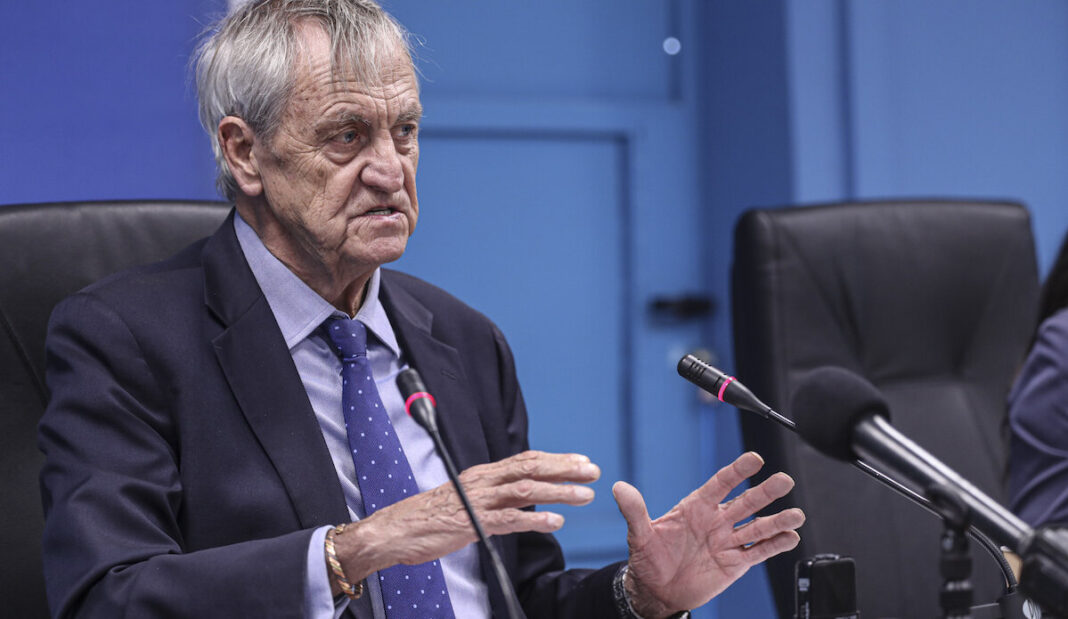UNMISS Chief, Nicholas Haysom. |Isaac Billy |Auteursrecht: UN Photo|.
Amid the public fatigue caused by the extension of the transitional period for the fourth time since South Sudan gained independence in 2011, the Special Representative of the UN Secretary-General, Nicholas Haysom, who doubles as the head of the United Nations Mission in South Sudan, advised the political leaders in South Sudan to quickly begin implementing the pre-election activities to avoid another extension of the transitional period.
Haysom stated this during the Human Rights Day commemorated in Juba on 10 December 2024. He said the National Elections Commission (NEC), at the end of a three-day planning retreat facilitated by the UN’s Integrated Electoral Assistance Team last week, has committed to developing a clear electoral operations timeline that will enable them to deliver credible elections by December 2026.
According to him, the detailed timetable will outline not only the political decisions needed for the NEC to fulfill its responsibilities but also the legal, financial, and technical requirements to fully implement elections within the timeframe.
Vitally, he said, the NEC has spotlighted the necessity to start immediate preparations for voter registration.
In a press statement, Haysom said the logistics-heavy exercise underpins the entire concept of democratic elections. “It’s simple – if you’re not registered to vote, you won’t have a voice in shaping your country’s future,” he challenged the leaders, adding that “the NEC has, therefore, unequivocally stated that key political, operational and resourcing decisions linked to voter registration and elections must be taken as soon as possible so that the actual process of registering voters and preparations for elections can start.”
From the UN perspective, comprehensive voter registration creates the space for all citizens—including the most vulnerable, but also reaching all ethnic and other communities—to come together in the shared enterprise of building a better future. It’s the springboard upon which the South Sudanese can launch a nation-building movement in the course of its first elections, he said.
“The Commission will also produce a list of critical amendments and clarifications to the legal framework governing elections. These are needed for the NEC to plan and begin implementing the electoral process, such as, for example: what aspects of the electoral systems will be used for different elections; how will IDPs, refugees, and South Sudanese living abroad participate; how will electoral disputes be settled; what are realistic timelines for the publication of results; what are the conditions for registering political parties, to name a few. Another important consideration is what population data would be used for boundary delimitation, taking into account electoral timeline requirements for a December 2026 election,” he added.
A strong legal framework promotes equity and confidence and is directly linked to elections that are considered legitimate, free, and fair by the people of South Sudan.
“I want to underscore that elections that don’t have the confidence of the population could be catastrophic for the country, even possibly sending it back into a relapse into conflict. It’s the outcome we must collectively strive to avoid at all costs because neither South Sudan nor the broader region can afford another war,” he stressed.
The NEC has earmarked several action points to make these outcomes possible. I’m heartened by the Commission’s efforts so far.
“I would simply urge that all political parties, stakeholders, and the Government take the related political and financial decisions to complete these steps early in the New Year.”
As I mentioned to the Security Council last month, the UN will continue moving ahead with assistance to the NEC, not only through programmatic activities but also through brick-and-mortar investments in the form of infrastructure support for the Commission in all 10 states, that is, building offices and spaces to enable them to function.
These will be funded through the Quick Impact Projects and complement our technical support to the NEC in planning and managing electoral processes.
The UN mission in South Sudan has also redoubled its political engagements at both national and sub-national levels to create a thorough awareness among political actors, civil society, security personnel, justice actors, community and faith-based leaders, women, and youth about their roles and responsibilities in political processes, especially since the burden of monitoring and observing elections will largely fall on the South Sudanese themselves.
“As I’m speaking to you now, we are concurrently hosting a political forum in Aweil with political parties, civil society, and security sector actors. The aim is to create trust among them, thereby enabling an open civic and political space for real conversations. In the past months, we’ve held similar meetings in Juba, Bor, Rumbek, Yambio, Wau, and Bentiu. I’m happy to say that this rolling initiative has led to written commitments from state leaders in Central and Western Equatoria, Lakes, Unity, and Jonglei on expanding the civic and political space—a critical condition for an enabling environment for elections,” Haysom said.
“Today on Human Rights Day, I pledge that we will continue driving initiatives to enhance civic and political space by enabling dialogues across the spectrum on what a democratic society means to the South Sudanese, and how they can collectively contribute to achieving it. An election cannot be conducted in an environment where people do not have the freedom to have these conversations, where a plurality of views and opinions aren’t encouraged. Expanding civic and political space, therefore, isn’t an empty slogan. It is the foundation for an electoral process that is free, fair, credible, and inclusive.”
As a demonstration of the support for this inclusive step, the United Nations mission in the country has sent a Radio Miraya team to Nairobi, giving all voices and opinions the platform to be heard across the country.




